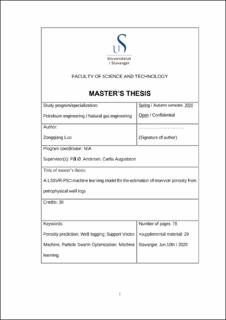| dc.contributor.advisor | Andersen, Pål Østebø | |
| dc.contributor.advisor | Augustsson, Carita | |
| dc.contributor.author | Luo, Zongqiang | |
| dc.date.accessioned | 2020-11-30T09:19:26Z | |
| dc.date.available | 2020-11-30T09:19:26Z | |
| dc.date.issued | 2020-06-10 | |
| dc.identifier.uri | https://hdl.handle.net/11250/2690102 | |
| dc.description | Master's thesis in petroleum engineering | en_US |
| dc.description.abstract | Reservoir porosity is a key parameter in the reservoir evaluation and geomechanics. To obtain accurate measurement of porosity can be time-consuming and expensive by core sampling or applying various well logging tools. Core sampling can also be limited to a small number of wells or partially sections of a wellbore. In this thesis, a more effective and economical method is introduced to provide porosity estimation. A least square support vector regression (LSSVR) model is developed to predict the reservoir porosity based on 1260 well logging data and porosity from routine core analysis from four wells in the Varg field, North Sea. Regularization and kernel parameters are the two primary components in the LSSVR algorithm, and they are optimized by employing particle swarm optimization (PSO) algorithm. A combined LSSVR-PSO model is developed to predict porosity by using petrophysical logs from Varg Field. As comparison, two unoptimized machine learning approaches k-nearest neighbors (KNN), support vector regression (SVR) and a hybrid porosity estimation method of density log, neutron log and sonic log are utilized. Feature selection is conducted and sonic log, gamma-ray log, deep resistivity log, density log and compensated neutron log are selected as input features while caliper log is discarded as insufficient correlation relationship with porosity. The predicted porosity result from LSSVR-PSO model for well 15/12-20S, showing higher accuracy with R2 =0.945, Root mean square error (RMSE) = 0.01341 comparing with KNN, SVR and the hybrid porosity estimation method. The proposed LSSVR-PSO model for porosity prediction is reliable in the datasets range and it can be a more general porosity estimation model by varying the scale of the data samples and the number of wells. | en_US |
| dc.language.iso | eng | en_US |
| dc.relation.ispartofseries | Masteroppgave/UIS-TN-IEP/2020; | |
| dc.subject | petroleumsteknologi | en_US |
| dc.subject | petroleum engineering | en_US |
| dc.subject | well logging | en_US |
| dc.subject | porosity prediction | en_US |
| dc.subject | support vector machine | en_US |
| dc.subject | particle swarm optimization | en_US |
| dc.subject | machine learning | en_US |
| dc.subject | maskinlæring | en_US |
| dc.title | A LSSVR-PSO machine learning model for the estimation of reservoir porosity from petrophysical well logs | en_US |
| dc.type | Master thesis | en_US |
| dc.subject.nsi | VDP::Teknologi: 500::Berg‑ og petroleumsfag: 510::Petroleumsteknologi: 512 | en_US |
